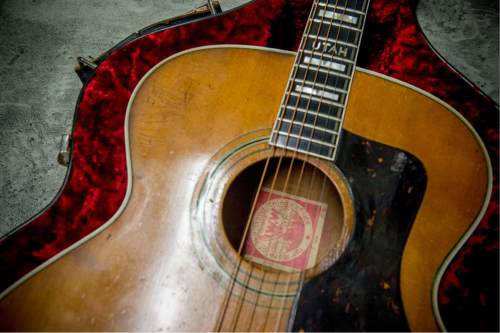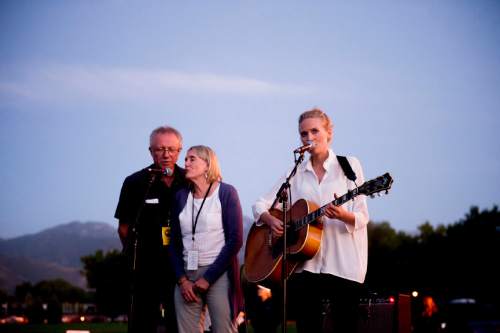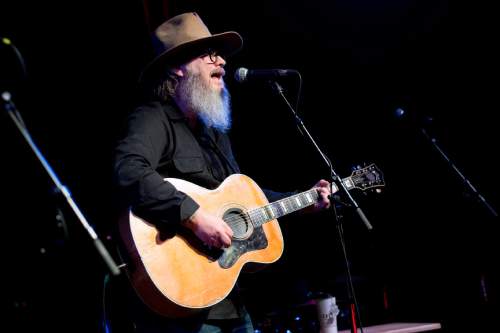This is an archived article that was published on sltrib.com in 2015, and information in the article may be outdated. It is provided only for personal research purposes and may not be reprinted.
Wittingly or not, Joe Hill threw the very last thing he had toward the rebel cause: his own ashes.
Thanks to his famous "Last Will," the labor troubadour's cremated remains would be divvied up, doled out, mailed, sprinkled, scattered and sung to, put in museums and a guitar, confiscated and destroyed as dangerous propaganda and even eaten by other songwriters — all with One Big Union in mind.
As a Utah firing squad set for Nov. 19, 1915, drew close, Hill wrote two telegrams to fellow International Workers of the World member William "Big Bill" Haywood, urging that any grief over his impending death be channeled into organizing. He also asked that his body be hauled post-execution across state lines.
"I don't want to be caught dead in Utah," Hill wrote to Haywood, who, though reading from the IWW stronghold of Chicago, was born in Salt Lake City.
Hill next composed his last will. Much as the living, breathing Joe Hill — the Swedish immigrant, the itinerant manual laborer, the songwriter and IWW mainstay — had rallied and stirred with his songs, his short poem of dying wishes took firm hold with its own powerful symbolism.
He chose to be cremated and pleaded that his ashes be used to rejuvenate and replenish. Hill's earthly remains would inspire people for a century, all because he wrote:
My body? —Oh!— If I could choose
I would to ashes it reduce,
And let the merry breezes blow
My dust to where some flowers grow
Perhaps some fading flower then
Would come to life and bloom again.
Sentenced to die on circumstantial evidence, Hill, 36 years old, fought desperately with two Utah State Prison guards after he awoke the morning of his execution. The slender Hill eventually was subdued, taken before a five-man firing squad, strapped to a wooden chair, blindfolded and shot dead.
When the squad commander called out "Ready, aim …," Hill reportedly shouted back, "Fire — go on and fire!" just before bullets pierced his chest.
—
'Released to the wind' • Thousands were said to have streamed by to view his body the next day as it lay in repose, dressed in a black suit, at O'Donnell's Mortuary on West Temple in Salt Lake City. On Nov. 21, some 300 people packed the mortuary's chapel for his Utah funeral as crowds thronged outside.
Typical of scalding newspaper coverage that greeted most IWW events in those days, the Ogden Standard-Examiner said of funeral attendees "that ninety percent of the murderous mob were low-grade foreigners." A New York Times account derisively called them "anarchists, nihilists, socialists, bums, and hobos."
After eulogies by Wobbly leaders and prominent Socialists, Hill's corpse was escorted by hearse to a downtown railroad station and shipped to Chicago. There, supporters conducted a second song- and oratory-filled memorial on a gloomy Thanksgiving Day, Nov. 25, 1915, before a capacity audience at West Side Auditorium. Participants delivered fiery tributes in English and nine other languages.
The next day, after being photographed, Hill's body was placed on a stone slab and cremated at Graceland Cemetery on Chicago's north side. Each IWW delegate reportedly viewed the flame-lashed casket through a hole in the side of the furnace.
The ashes were to be divided into small packets and, according to an IWW newspaper editor's account on May 1, 1916, "released to the wind," as per Hill's last wishes.
Just how far and wide they went remains a mystery.
—
Never forgotten • Exactly one year after Hill's death, an unnamed New York Times reporter opened his four-paragraph story on the annual IWW convention in Chicago this way: "Six hundred envelopes, each bearing a share of the ashes of Joe Hill's body, will go the ends of the earth."
About 150 convention delegates reportedly received packets in person, and an additional 450 envelopes went out by mail to every state IWW chapter — except for Utah — and, purportedly, to other Wobbly-friendly groups worldwide in early 1917, some accompanied with a rousing letter signed by IWW head Haywood.
The small envelopes featured a portrait of Hill on one side — described as "Murdered by the Capitalist Class" — and a copy of his rhyming will on the other, with the footnote: "WE NEVER FORGET." Upon opening the packets, recipients found instructions that included mailing an account of any ceremonies back to IWW headquarters.
"Among the last words I had from Joe Hill was a Telegram, 'Don't waste any time in mourning — ORGANIZE!' " each typed letter from Haywood read. "Let our answer to this message be our best work and redoubled efforts during the coming years.
"With best wishes, I am Yours for Industrial Freedom, W.D. Haywood."
—
A union laid low • Under siege by angry employers, privately hired thugs, police, state militias and the U.S. government, most Wobblies would have welcomed some inspiration around that time, an era loosely dubbed "the Red Scare."
The winds of history, in many cases, carried Hill's ashes with them.
The years immediately after Hill's execution saw an upswing of violent attacks on union organizers and leftist politicians. A series of disruptive raids, arrests and government repression targeted Wobblies and other U.S. labor leaders, as much for their radical philosophy as their involvement in hundreds of strike actions, free-speech protests, workplace sabotage and open dissent toward World War I.
Other martyrs would follow Hill in months after his death, including 11 union members shot or lost in a Nov. 5, 1916, shootout between lumber workers and sheriff's deputies aboard an ocean steamer near Everett, Wash. IWW executive board member and anti-war activist Frank Little was kidnapped Aug. 1, 1917, from his boardinghouse room in Butte, Mont., where he had attended an anti-war event. Little was lynched and left hanging on a railroad trestle.
On Sept. 5 and 6, 1917, the U.S. Department of Justice sent agents to rifle through IWW offices and union members' homes in several U.S. cities, including Chicago, Philadelphia, Denver, Los Angeles, San Francisco and Spokane. In Salt Lake City's raid, police seized 2,000 memorial pictures of Little, along with scads of union literature.
Across the country, authorities carted off truckloads of IWW papers, records, membership rosters, correspondence, pamphlets, printed matter and other items. In Chicago, agents took three days to remove nearly 5 tons of office materials, including most of the remaining envelopes of Hill's ashes.
The combined blows were profound, though Haywood and other Wobbly leaders remained defiant.
"We who have nothing to hide, and never have had, have nothing to fear from a fair and square investigation," the IWW secretary-treasurer wrote to fellow workers.
Much of the confiscated evidence was ultimately destroyed, along with untold clues on just where the labor songster's ashes may have blown.
—
'Good Bye, Joe' • Some packets of his final worldly remains reached their intended recipients. Several Joe Hill memorials across heartland America generated stories in union newspapers, along with historic photos and personal accounts.
A Cleveland IWW chapter conducted a March 1917 shoreside ceremony complete with banners and music before spreading Hill's ashes on the waters of Lake Erie. One attendee of that rite, George Carey, found a second packet in 1919 in a wrecked IWW hall in Toledo. After years of trying to deliver the ashes to a union official, he held his own ceremony one bright June morning in 1950.
"Nature seemed to have outdone herself that day when I awoke to the realization that I was grown old and had an obligation to carry out," Carey wrote. "I arose and walked out into the garden and with no more ceremony than a murmured, 'Good Bye, Joe,' I carefully scattered the contents of the little envelope over the soil.
"I felt at ease," he said. "My pledge had been kept."
Officials at a Finnish labor college in Duluth, Minn., sprinkled Hill's ashes before assembled students and faculty in February 1917 in a gesture intended to cement bonds between the IWW and the school.
Several accounts also survive of a May Day 1917 ceremony in Seattle in which Wobblies packed Mount Pleasant Cemetery to watch the labor martyr's ashes scattered on the graves of three union members killed in gunfire aboard the steamship Verona, an incident that by then was being called the Everett Massacre.
"Thousands of men and women fell into a marching line of fours, a committee pinning a red rose or carnation on each marcher," according to one IWW description, with their ranks extending "fifteen solid blocks."
After tossing Hill's ashes "to the breeze," ritual participants reportedly sprinkled on top the cremains of two local union organizers — "loyal fighters in the class struggle" — lost during the prior year.
—
In the mail • In late September 1917, 166 top IWW members were arrested and charged with conspiracy to hamper the U.S. war effort and violently overthrow the government. Many immigrant leaders within IWW ranks were deported.
On Oct. 11, 1917, a Chicago postmaster forwarded to his superiors in Washington, D.C., a first-class letter that he said "was accidentally mutilated in the process of machine cancellation." Its contents expelled "and their nature unavoidably disclosed" as being Hill's ashes, postmaster W. B. Carlile wrote that he sent the letter "for such attention as you may deem proper."
Labor historians now believe such attention likely extended to invasive scrutiny of private mail to and from Wobbly leaders in the U.S. and abroad. Some doubt the story about a postal accident, suggesting it was a cover for a widespread pattern of intercepting mail the government considered subversive.
And in all likelihood, Hill's ashes detected in the post would have been deemed materials with highly dangerous propaganda value — subjecting them to seizure under special war powers.
Some theorize the Chicago letter — sent to a Charles Gepford, whose name was never linked to IWW officialdom — might have been mailed to a nonunion member just as U.S. agents descended on an IWW enclave, in a rushed bid to keep the last of Hill's leftovers in sympathetic hands.
—
Ashes of old • The mangled packet, complete with Hill's ghostly likeness and a copy of Haywood's cover letter, stayed at U.S. Postal Service headquarters in Washington until the 1940s, eventually landing at the U.S. National Archives and out of sight for decades.
Utah historian Lori Taylor came across the ashes while in graduate school in the 1980s. As word of her work spread, it alerted the IWW, which had been unaware the index card-size packet existed.
Veteran IWW member and Chicago economics professor Fred Lee petitioned to have the ashes returned and, after many months, secured their release to IWW delegates.
Accompanied by folk singer and labor organizer Bruce "Utah" Phillips, Lee collected the small container from Washington in 1988, touching off a debate on what should happen to the newly found relics.
Lee, who died in 2003 after 29 years as an ardent IWW member, lobbied for a share to be sent to a museum devoted to Joe Hill, born as Joel Emmanuel Hägglund, in his native Sweden. He also sought to steer a dab to Waldheim cemetery in Chicago, the resting place of many notable figures in U.S. labor and anarchist history.
Some of Hill's ashes were kept in a small shrine at IWW Chicago headquarters, coddled in an unassuming clay urn emblazoned with "Don't mourn, Organize," apparently in Joe Hill's handwriting.
Utah Phillips, white-bearded storyteller and a proud Wobbly for most of his life, put some of the National Archives ashes into the hollow of one of his acoustic guitars. The instrument today hangs at the Murray home of his son, Duncan Phillips.
Some of the recovered remains also found their way to Wobbly headquarters in blue-collar Tacoma, Wash., the site of several high-profile labor actions when Hill was alive.
In a November 1992 ceremony at Bethlehem Farm in nearby Chehalis, Wash., about two dozen people told stories, sang from songs from the IWW's "Little Red Songbook" and heard Wobbly Allen Anger recall the IWW's focus on human dignity.
"We got beat really bad," Anger reportedly told the gathering. "And that's why there's not many of us left."
As smoke rose from a burning bowl of anointed juniper, sage and sweet grass, each person in attendance took a pinch and tossed Hill's ashes into a misty night.
"It is the right of all of us to pay our respects," Anger said. "Joe Hill made an indelible imprint on American culture."
—
Cup of Joe • Not long before his death in 1989, noted Vietnam protester, activist and self-dubbed "Yippie" Abbie Hoffman reportedly argued that to preserve Joe Hill's legacy, present-day folk singers should eat his ashes, referring to the burnt remains as the "corpus anarchi," Latin for "body of anarchy."
And after those singers died, Hoffman said, their ashes could be eaten by subsequent generations and so on.
In this way, the 1960s radical leader argued, Hill would live forever, in keeping with the famous lyric "I never died, said he" from a 1930s song about Hill, as well as the central wish of Hill's last will.
Hoffman called out his friend English rocker and social activist Billy Bragg to take up the challenge, almost as a dare.
Bragg said his first reaction was surprise. "Well, thanks a lot, Abbie!" he said in a recent interview with The Salt Lake Tribune, noting Hoffman's reputation as the Great American Prankster. "I just took it with … I would say a pinch of salt but that's probably the wrong metaphor."
Bragg found himself in Chicago for a performance a few years later. He said that after the show, some Wobblies approached him from the crowd.
"They basically said, 'We've got some of Joe's ashes and we're wondering if you might be interested in taking him up on that.' "
Hoffman had recently died, the IWW members noted.
"That was more of a reason for me to do it than all the other things, really," Bragg said. "It was kind of Abbie's last prank and I felt I would be betraying him if I didn't live up to his sense of humor by doing it."
They bought a bottle of union-brewed beer, as he remembered it.
"We toasted Joe and we toasted Abbie and we toasted the Wobblies," Bragg said. "And, um, down it went."
The Wobblies also gave Bragg some ashes to pass on to singer Michelle Shocked, whom Hoffman had also mentioned. Bragg said he kept the ashes folded up in a little plastic bag, tucked into a 1935 edition of the "Little Red Songbook" in his library. After not seeing Shocked "for years and years and years," Bragg heard she had become a born-again Christian, taking "a rather different path than myself and Abbie and Joe," he said.
So instead, Bragg thought of Otis Gibbs, a young Indiana singer-songwriter whom he had met performing in a soup kitchen in Austin. "I just figured he was the kind of guy that Abbie and Joe would think was doing the right kind of thing," he said.
Bragg offered Gibbs the ashes.
"He rather sheepishly said, 'Really?' " Bragg recalled.
"Really, I said. You've got to trust me on this."
Gibbs ate them.
"And I can't think of a better candidate, quite frankly, for keeping alive the flames of the IWW," Bragg told the magazine Nuvo. "I was very, very pleased to be able to do that."
Gibbs released an album in 2010 titled "Joe Hill's Ashes," recorded in his living room.
—
Back to the future • The 100th anniversary of Hill's execution renewed interest in the labor poet's protest music and his story, with commemorative events that included a series of Labor Day musical performances of his songs at Utah's Sugar House Park.
As part of the day's free concert, Swedish singer and composer Lovisa Samuelsson — Hill's great-grandniece — performed near the spot where Hill was executed. She played Utah Phillips' guitar, with Hill's ashes in it, in effect bringing a piece of the Wobbly's body back to where he died.
There Joe Hill was, caught dead in Utah — though this time, while his songs floated out on a placid summer day, in the company of many would-be friends.
Twitter: @TonySemerad —
Online: Who was Joe Hill?
O This month marks 100 years since the execution of labor icon and musician Joe Hill in Salt Lake City. Find videos, historic documents, photos and more at JoeHill.sltrib.com.
O The Utah State Archives have posted more than 4,000 images of records related to the international controversy surrounding Hill's execution. Find them at http://archives.utah.gov/digital/joe-hill.html.







